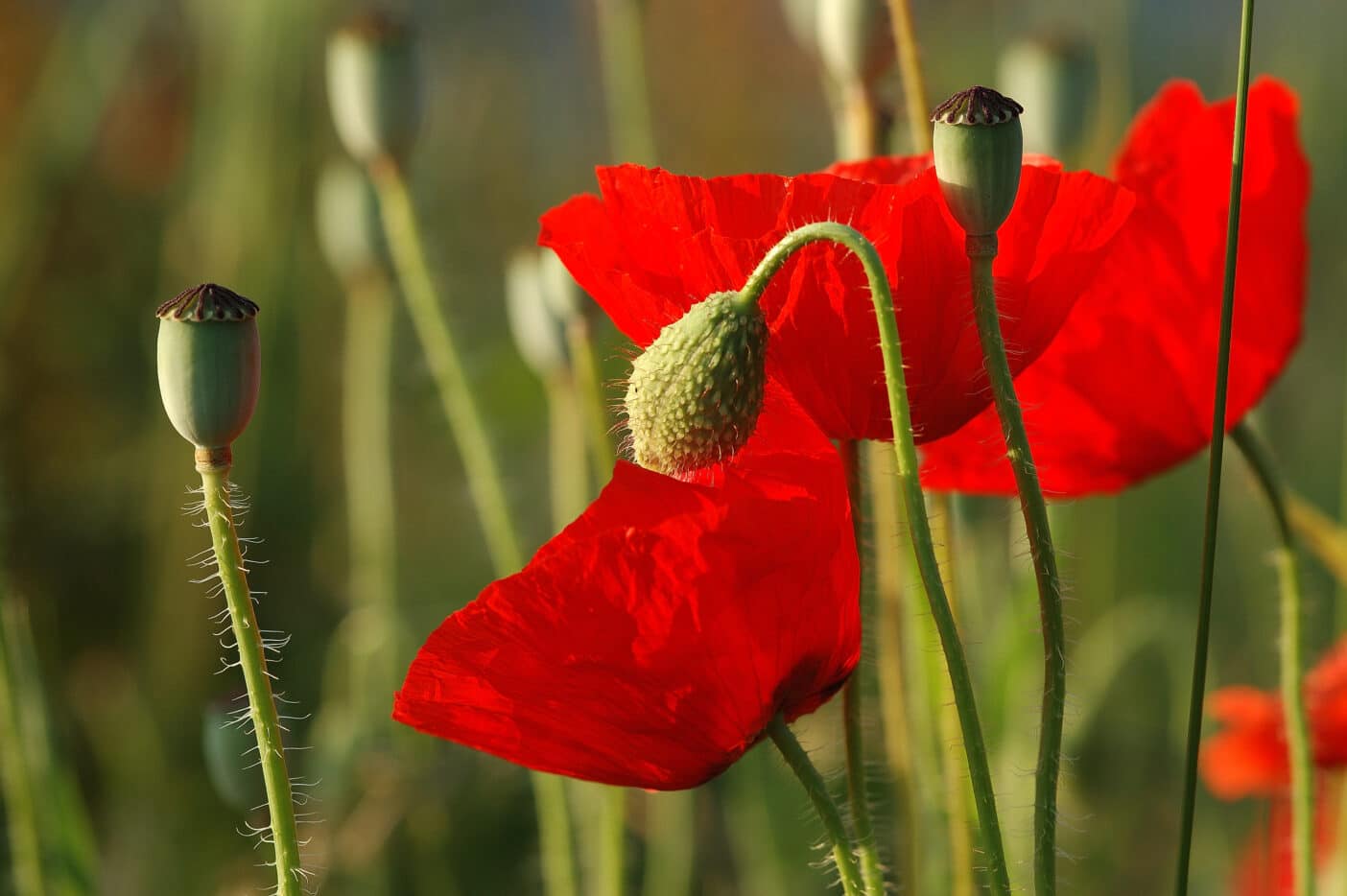Corn poppy (Papaver rhoeas)

With its scarlet flowers, the poppy (Papaver rhoeas) is a fantastic eye-catcher in meadows and gardens. It originates from the eastern Mediterranean and was a typical companion plant in agriculture in earlier times. However, due to improved seed cleaning and increasing chemical weed control, it is now much less common in fields. Larger stands can be found today along railroad lines and roads, on rubble dumps and on embankments. The corn poppy can grow up to one meter tall and has a very hairy stem. It was Germany’s “Flower of the Year” in 2017. With this nomination, the Loki Schmidt Foundation wanted to draw attention to the rapid decline in wildflowers.
The large flowers with the delicate, bright leaves only last for a short time: sometimes just one day. When they fall off, the fruit capsules containing the black poppy seeds become visible.
The poppy is a traditional medicinal plant, even if its effect is not nearly as pronounced as that of the real poppy. Nevertheless, the flowers, which are usually made into either tea or syrup in folk medicine, have an analgesic and calming effect. They are traditionally used for nervous tension, insomnia, irritability, but also for coughs and asthma. A few years ago, small children who could not get to sleep were given poppies. However, its effectiveness could never be proven. In the 19th century, people made poppy seed oil from olive oil and poppy flowers, which could help against rheumatism. Poppy seeds are also said to be able to relieve abdominal cramps in women.
Corn poppy and its cosmetic effects
Corn poppy contains the alkaloid rhoeadin, saponins, mucilage and bitter substances, anthocyanin glycosides and tannins. The alkaloid rhoeadin, which is mainly found in the white milky sap, is considered slightly toxic. Excessive consumption can lead to abdominal pain and vomiting. However, this does not apply to external use. Anthocyanins belong to the flavonoids and secondary plant substances.
In cosmetics and dermatology, the plant is mainly used to treat skin rashes and eczema. Itching, which causes discomfort on both the skin and the scalp, can often be successfully treated with corn poppy. It also often provides good results for boils.
Several studies have shown that poppy seed extract can influence both lipogenesis and lipolysis. This means that it is an attractive option for skin tightening and is very suitable for cosmetic products for the treatment of cellulite. According to a study, an extract from poppy seed blossoms also has an anti-cytotoxic and anti-mutagenic effect.
Laboratory tests have shown that the harmful effects of zeocin (a copper-chelating glycopeptide antibiotic that mainly contains phleomycin D1 and is considered to damage DNA) can be mitigated by poppy seed extract. When applied externally in low doses, no side effects are generally to be expected.
Although poppy seed often leads to a significant improvement when used correctly, it is still only found in a few cosmetic products.
Profile poppy seed (extract)
INCI: Papaver Rhoeas Flower Extract (alternatively: Papaver Rhoeas Seed Oil)
CAS number: 84696-43-5
EINCS/ELINCS: 283-651-5
Description: Extract from the flowers of the poppy seed
Most important ingredients: rhoeadin, allocryptopin, berberin, coptisin, roemerin, sinactin, papaverine, anthocyanins, mucilage, depsides, tannins, meconic acid and mecocyanin
Effect: expectorant, tonic, antispasmodic, calming, said to help you fall asleep, relieves skin rashes, itching (also on the scalp) and eczema, has a skin-tightening effect, ideal for treating cellulite
Possible applications: Care creams and lotions
We like to work with these active ingredients:
| Name | Company Name | INCI Name | Remarks |
|---|---|---|---|
| Organic Red Poppy Oily Extract - BCE1564 | Biocosmethic | Helianthus Annuus (Sunflower) Seed Oil , Papaver Rhoeas Petal Extract | |
| Phytofleur™ Red Poppy GL | Crodarom | Glycerin , Aqua , Papaver Rhoeas Petal Extract | |
| PRODHY-EXTRACT® COQUELICOT | Laboratoires Prod'Hyg | Papaver Rhoeas Petal Extract , Propylene Glycol | |
| PRODHY-EXTRACT® COQUELICOT BG | Laboratoires Prod'Hyg | Propylene Glycol , Papaver Rhoeas Petal Extract , Aqua | |
| RonaCare® Poppy SE | Merck KGaA | Caprylic/Capric Triglyceride , Papaver Rhoeas Extract , Tocopherol | |
| PRODHYSKIN® COQUELICOT HTOR | Laboratoires Prod'Hyg | Papaver Rhoeas Petal Extract , Helianthus Annuus (Sunflower) Seed Oil , Tocopherol | |
| Phytogen | The Garden of Naturalsolution Co., Ltd. | Cimicifuga Racemosa Root Extract , Dioscorea Japonica Root Extract , Lithospermum Erythrorhizon Root Extract , Papaver Rhoeas Petal Extract , Punica Granatum Fruit Extract , Trifolium Pratense (Clover) Leaf Extract , Ziziphus Jujuba Fruit Extract |
Corn poppy, an innovative active ingredient for modern cosmetic products
As a medicinal plant, corn poppy primarily has a calming and pain-relieving effect; as a cosmetic active ingredient, it provides soothing relief for skin rashes, itching and eczema. It can also tighten the skin and counteract cellulite. The extract is a completely natural and well-tolerated active ingredient that is perfect for high-quality (natural) cosmetics. If you are also interested in sophisticated formulations with corn poppy extract, we at Cosmacon will be happy to help you!
Literature:
Hmamou A, El-Assri EM, El Khomsi M, Kara M, Zuhair Alshawwa S, Al Kamaly O, El Oumari FE, Eloutassi N, Lahkimi A.Saudi Pharm J. 2023 Aug;31(8):101686
Flower Extracts as Multifunctional Dyes in the Cosmetics Industry.
Bujak T, Zagórska-Dziok M, Ziemlewska A, Nizioł-Łukaszewska Z, Lal K, Wasilewski T, Hordyjewicz-Baran Z.Molecules. 2022 Jan 29;27(3):922
Bujak T, Zagórska-Dziok M, Ziemlewska A, Nizioł-Łukaszewska Z, Wasilewski T, Hordyjewicz-Baran Z.Molecules. 2021 May 10;26(9):2809